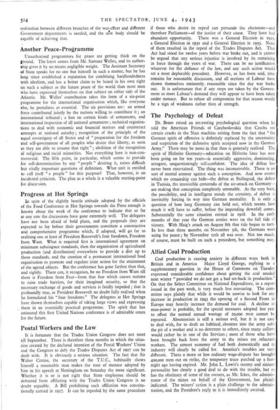Postal Workers and the Law
It is fortunate that the Trades Union Congress does not meet till September. There is therefore three months in which the situa- tion created by the declared intention of the Postal Workers' Union and the Congress to defy the Trades Disputes Act of 1927 can be dealt with. It is obviously a serious situation. The fact that Sir Walter Citrine, the secretary of the T.U.C., habitually shows himself a reasonable man makes the tone of menace adopted by him in his speech at Nottingham on Saturday the more significant. Whether it is or is not right that State employees should be debarred from affiliating with the Trades Union Congress is no doubt arguable. A Bill prohibiting such affiliation was constitu- tionally carried in 1927. It can be repealed by the same procedure if those who desire its repeal can persuade the electorate—and therefore Parliament--of the justice of their cause. They have had abundant opportunity. There was a General Election in 1929, a General Election in 1931 and a General Election in 1935. None of them resulted in the repeal of the Trades Disputes Act. That Act had stood for twelve years before war broke out, and it cannot be argued that any serious injustice is involved by its remaining in force through the years of war. There can be no justification whatever for flat defiance of the law, and any such action would set a most deplorable precedent. However, as has been said, time remains for reasonable discussion, and all sections of Labour have shown themselves eminently. reasonable since the day war broke out. It is unfortunate that if any steps are taken by the Govern- ment to meet Labour's demand they will appear to have been taken under menace. But to refuse all compromise for that reason would be a sign of weakness rather than of strength.


























 Previous page
Previous page